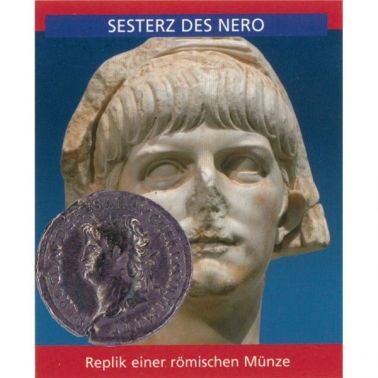Sestertius of Nero - Roman Coins Replica
Sestertius of Nero
Obverse: Head of Nero with laurel wreath looking left, around the head the inscription: NERO CLAVD(ius) CAESAR AVG(ustus) GER(manicus) P(ontifex) M(aximus) TR(ibunicia) P(otestate) IMP(erator) P(ater) P(atriae).
Translation (and explanation): Nero Claudius (his name), Caesar Augustus (title of emperor), Germanicus (conqueror of the Germanic tribes), Pontifex Maximus (chief priest), bearer of the authority of a tribune of the people, Imperator (chief general), Father of the Fatherland (title of honour).
Reverse: Nero in armour riding to the right, behind him a soldier. On both sides the riders S - C (Senatus Consultum, coin minted by senate decision), below them the inscription DECURSIO (military parade).
The emperor shows himself here together with his soldier during training or a parade and thus wants to emphasise his role as commander-in-chief of the military and at the same time his physical or soldierly abilities.
Minted in Lugdunum (Lyon, France), ca. 65 A.D.
Material: Original made of bronze; copy made of tin alloy with patination.
All coin replicas were cast from originals. They are available individually or in various sets.
Surviving prices for the 1st and 2nd century
1 aureus = 25 denarii,
1 denarius = 25 sestertii,
1 sestertius = 2 dupondii,
1 Dupondius = 2 Ass.
A pig costs 75 denarii
"Pecunia non olet!" - Money does not stink
Emperor Vespasian had taken over from his predecessor Nero a state that was almost bankrupt.
Vespasian reorganised the public budgets with great success. His ingenuity in increasing state revenues was great. Among other things, he introduced a tax on public latrines. When his son Titus objected to this, he held some coins from the tax revenue under his nose and asked if this smell bothered him. Titus had to concede that the money did not stink: Pecunia non olet.
The saying has persisted to this day to justify the possession of money from dubious sources of revenue. The public toilets in Paris are still called "Vespasienne" today. In Italy, too, the public toilets are called "Vespasiani".

